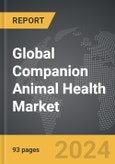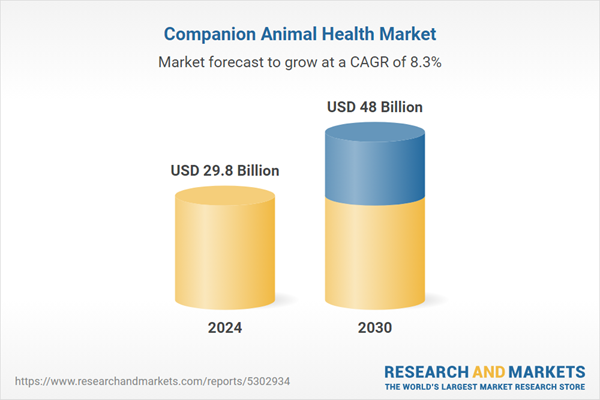Global Companion Animal Health Market - Key Trends & Drivers Summarized
Why Is Companion Animal Health Important and What Does It Encompass?
The companion animal health market encompasses a wide range of products and services focused on the health and well-being of pets, including diagnostics, therapeutics, vaccines, dietary supplements, and wellness services. As pet ownership rises globally, companion animals have become integral parts of households, and their health is prioritized similarly to human family members. Veterinary care, preventive medicine, and nutritional products are essential components of this market, supporting pet owners in maintaining the health of their animals. Companion animal health products help prevent and treat various conditions, including parasitic infections, allergies, joint issues, and chronic diseases, enhancing quality of life for pets and offering peace of mind to pet owners. Companion animal health has gained importance as pets increasingly occupy a central role in family life. The demand for advanced veterinary care, pet insurance, and specialty treatments has grown, as owners seek out high-quality health solutions for their animals. With advances in veterinary science, diagnostic tools, and specialized pet therapeutics, pets can now benefit from preventive care and treatments once reserved for humans. This shift reflects broader trends in human healthcare, with a rising emphasis on preventive and wellness-focused approaches. As the pet population continues to grow, the companion animal health market is poised to meet rising consumer expectations for comprehensive, compassionate care.How Are Technological Advances Impacting Companion Animal Health?
Technological advancements are transforming the companion animal health market by enabling new diagnostic, therapeutic, and wellness solutions. Innovations in diagnostic tools, including imaging technologies and lab-on-a-chip devices, allow for faster, more accurate diagnoses of health issues in animals. Additionally, advances in genetic testing help identify breed-specific health risks, enabling personalized treatment plans and preventive care tailored to each pet. Wearable health-monitoring devices, which track vital signs, activity levels, and behavior, provide pet owners and veterinarians with real-time data to monitor pet health and catch early signs of health issues, enhancing preventive care. On the treatment side, advancements in pharmaceuticals and biotechnology have introduced novel therapeutics, such as monoclonal antibodies and biologics, for treating chronic conditions like arthritis and allergies in pets. Telemedicine platforms have also gained traction, especially since the COVID-19 pandemic, offering remote consultations and follow-up care. This digital shift improves accessibility to veterinary services, allowing pet owners to manage routine care and seek advice conveniently. These technological trends reflect a growing commitment to advancing pet healthcare, empowering veterinarians with tools for better diagnostic accuracy and personalized care, and helping pet owners proactively manage their pets' well-being.What Are the Key Applications of Companion Animal Health Products?
Companion animal health products cover a wide range of applications, from preventive care and wellness to therapeutic treatments for chronic and acute conditions. Vaccines and antiparasitic treatments form the core of preventive care, protecting pets from common diseases and parasites. Routine health supplements, including vitamins and probiotics, support digestive health, joint mobility, and skin condition, particularly for aging pets or breeds predisposed to health issues. Diagnostic tools, including blood tests, X-rays, and genetic screenings, allow veterinarians to detect underlying health conditions early, providing better treatment options and prognosis.Therapeutic products are used to manage chronic conditions like diabetes, arthritis, and cardiovascular issues, helping improve pets' quality of life. Pain management solutions, such as non-steroidal anti-inflammatory drugs (NSAIDs), are also commonly prescribed to alleviate discomfort in pets with mobility issues or post-surgery. Specialized pet foods cater to various health needs, offering formulas tailored for weight management, renal health, and digestive care. These applications emphasize the comprehensive nature of companion animal health, addressing preventive, diagnostic, and therapeutic needs to ensure pets live healthier, more comfortable lives.
What Factors Are Driving Growth in the Companion Animal Health Market?
The growth in the companion animal health market is driven by several factors, including rising pet ownership, technological advancements in veterinary care, and increased spending on pet wellness. The surge in pet ownership, especially during the COVID-19 pandemic, has led to a greater focus on pet healthcare, with owners investing more in preventive care, wellness products, and specialized treatments. Technological innovations, such as telemedicine and genetic testing, have expanded accessibility to veterinary services and introduced new preventive options, making advanced healthcare more convenient and affordable. Additionally, the growth in pet insurance has reduced out-of-pocket expenses for pet owners, enabling them to pursue more extensive treatment plans for their animals. Consumer demand for high-quality pet products and services, including organic and functional foods, supplements, and specialty pharmaceuticals, has also contributed to market expansion. Awareness of the importance of preventive care is rising, encouraging pet owners to invest in regular check-ups, vaccinations, and dietary supplements. This shift toward proactive pet healthcare, combined with the increasing humanization of pets, underscores the companion animal health market's continued growth. As pet care continues to mirror trends in human healthcare, the market is set to expand, offering products and services that cater to a more holistic approach to animal wellness.Report Scope
The report analyzes the Companion Animal Health market, presented in terms of market value (US$ Thousand). The analysis covers the key segments and geographic regions outlined below.- Segments: Product (Pharmaceuticals, Vaccines, Diagnostics, Feed Additives, Other Products); Distribution Channel (Hospital Pharmacies, Retail, eCommerce); End-Use (Veterinary Hospitals & Clinics, Point-of-Care Testing / In-House Testing, Other End-Uses).
- Geographic Regions/Countries:World; United States; Canada; Japan; China; Europe (France; Germany; Italy; United Kingdom; Spain; Russia; and Rest of Europe); Asia-Pacific (Australia; India; South Korea; and Rest of Asia-Pacific); Latin America (Argentina; Brazil; Mexico; and Rest of Latin America); Middle East (Iran; Israel; Saudi Arabia; United Arab Emirates; and Rest of Middle East); and Africa.
Regional Analysis
Gain insights into the U.S. market, valued at $7.7 Billion in 2024, and China, forecasted to grow at an impressive 12.3% CAGR to reach $12.2 Billion by 2030. Discover growth trends in other key regions, including Japan, Canada, Germany, and the Asia-Pacific.Why You Should Buy This Report:
- Detailed Market Analysis: Access a thorough analysis of the Global Companion Animal Health Market, covering all major geographic regions and market segments.
- Competitive Insights: Get an overview of the competitive landscape, including the market presence of major players across different geographies.
- Future Trends and Drivers: Understand the key trends and drivers shaping the future of the Global Companion Animal Health Market.
- Actionable Insights: Benefit from actionable insights that can help you identify new revenue opportunities and make strategic business decisions.
Key Questions Answered:
- How is the Global Companion Animal Health Market expected to evolve by 2030?
- What are the main drivers and restraints affecting the market?
- Which market segments will grow the most over the forecast period?
- How will market shares for different regions and segments change by 2030?
- Who are the leading players in the market, and what are their prospects?
Report Features:
- Comprehensive Market Data: Independent analysis of annual sales and market forecasts in US$ Million from 2024 to 2030.
- In-Depth Regional Analysis: Detailed insights into key markets, including the U.S., China, Japan, Canada, Europe, Asia-Pacific, Latin America, Middle East, and Africa.
- Company Profiles: Coverage of players such as Ameri-Pac Inc., Bayer AG, Boehringer Ingelheim GmbH, Ceva Santé Animale, Conklin Company Inc and more.
- Complimentary Updates: Receive free report updates for one year to keep you informed of the latest market developments.
Some of the 42 companies featured in this Companion Animal Health market report include:
- Ameri-Pac Inc.
- Bayer AG
- Boehringer Ingelheim GmbH
- Ceva Santé Animale
- Conklin Company Inc
- Elanco
- Merck Animal Health
- Merial
- Nutreco N.V.
- Vetiquinol S.A.
- Virbac
- Zoetis
This edition integrates the latest global trade and economic shifts into comprehensive market analysis. Key updates include:
- Tariff and Trade Impact: Insights into global tariff negotiations across 180+ countries, with analysis of supply chain turbulence, sourcing disruptions, and geographic realignment. Special focus on 2025 as a pivotal year for trade tensions, including updated perspectives on the Trump-era tariffs.
- Adjusted Forecasts and Analytics: Revised global and regional market forecasts through 2030, incorporating tariff effects, economic uncertainty, and structural changes in globalization. Includes historical analysis from 2015 to 2023.
- Strategic Market Dynamics: Evaluation of revised market prospects, regional outlooks, and key economic indicators such as population and urbanization trends.
- Innovation & Technology Trends: Latest developments in product and process innovation, emerging technologies, and key industry drivers shaping the competitive landscape.
- Competitive Intelligence: Updated global market share estimates for 2025, competitive positioning of major players (Strong/Active/Niche/Trivial), and refined focus on leading global brands and core players.
- Expert Insight & Commentary: Strategic analysis from economists, trade experts, and domain specialists to contextualize market shifts and identify emerging opportunities.
Table of Contents
Companies Mentioned (Partial List)
A selection of companies mentioned in this report includes, but is not limited to:
- Ameri-Pac Inc.
- Bayer AG
- Boehringer Ingelheim GmbH
- Ceva Santé Animale
- Conklin Company Inc
- Elanco
- Merck Animal Health
- Merial
- Nutreco N.V.
- Vetiquinol S.A.
- Virbac
- Zoetis
Table Information
| Report Attribute | Details |
|---|---|
| No. of Pages | 381 |
| Published | February 2026 |
| Forecast Period | 2024 - 2030 |
| Estimated Market Value ( USD | $ 29.8 Billion |
| Forecasted Market Value ( USD | $ 48 Billion |
| Compound Annual Growth Rate | 8.3% |
| Regions Covered | Global |









